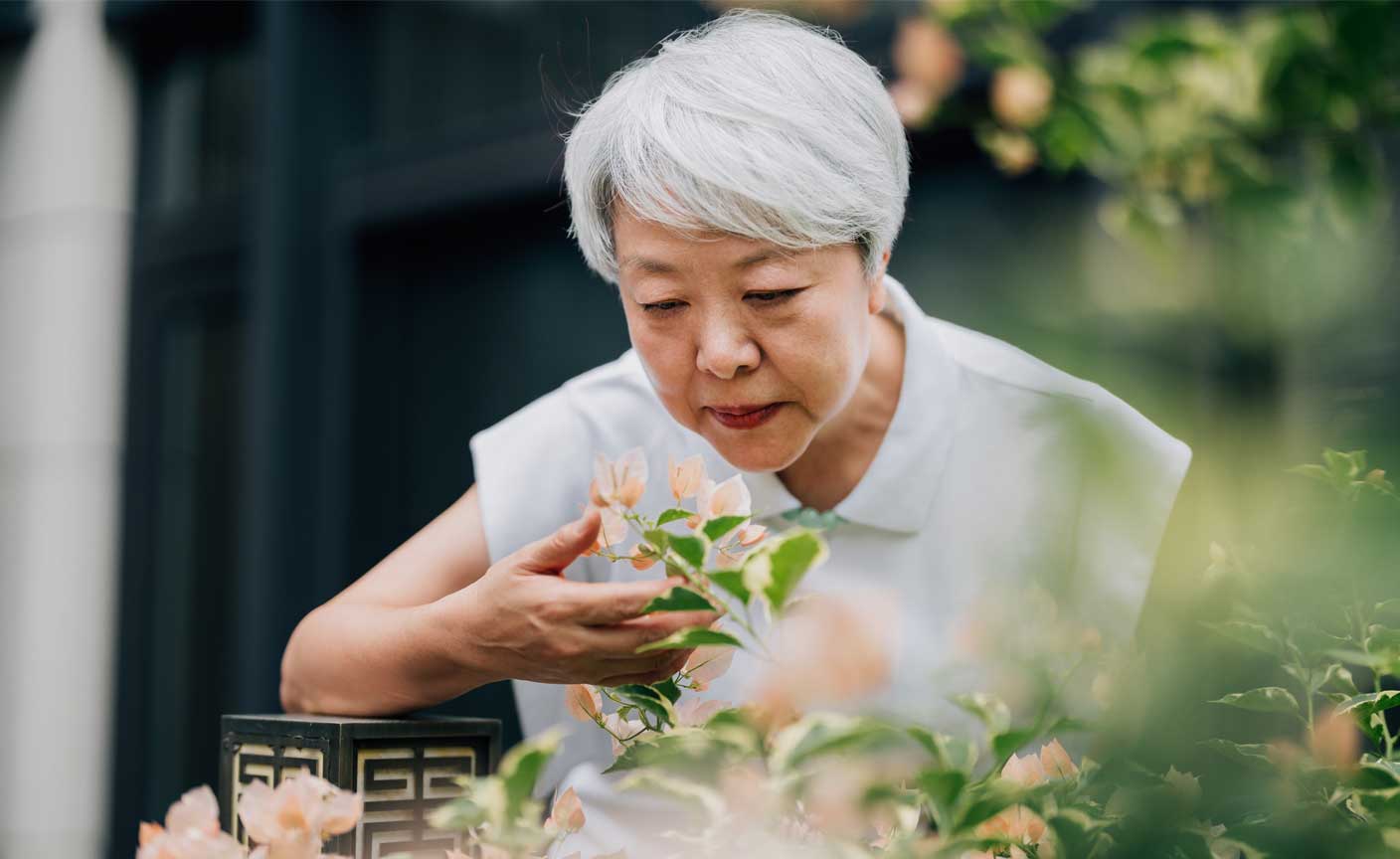There’s no cure for hay fever, but there are things you can do to manage the symptoms.
Key takeaways
Natural remedies could help you improve your symptoms.
Find out about 5 great alternatives to medication.
There’s a lot to get excited about when spring arrives. The warm weather thaws out your soul, flowers bloom and your veggie garden gathers pace.
But then there’s that other thing. Hay fever.
If you’re among the almost one in 5 Australians who experience seasonal hay fever symptoms,1 you probably know that your hyped-up immune system works extra hard in spring to fend off allergens, leaving you with unwanted symptoms like itchy eyes and a runny nose. And, unfortunately, there’s no cure for hay fever.
While medications like antihistamines might be an obvious go-to, did you know there are numerous natural remedies that you can try instead? Here are 5 great options to help you beat your hay fever symptoms.
1. Acupuncture
Acupuncture is a well-established, holistic alternative to traditional Western medicine. And when it comes to treating hay fever, it’s easy to see why.
Inserting thin needles into acupoints is said to help relieve allergy symptoms by treating your body’s overreactive immune responses triggered by allergens, allowing the body to become more resilient to irritants.
Research from Griffith University reveals that acupuncture may be effective in reducing your body’s levels of immunoglobulin E, which is associated with allergic symptoms.2
Another study found that acupuncture may help reduce symptoms like sneezing and itchiness.3
2. Probiotics
Some evidence suggests that beneficial bacteria found in probiotics might not only boost the intestinal tract but may also help relieve hay fever symptoms.4
Interestingly, further research suggests that probiotics may also reduce the number of allergic rhinitis episodes experienced each year, which can cause year-round allergies.5
While there’s a range of probiotic supplements available, you can also get your daily dose through probiotic foods like yoghurt, miso, tempeh, sauerkraut and kefir.
3. Vitamin C
While not an allergy cure-all, vitamin C can act as a natural antihistamine and antioxidant, which may help decrease inflammation and improve allergy symptoms.
A 2018 study examining the effects of vitamin C intravenous line (IV) infusions in people with allergic rhinitis symptoms (including sneezing, runny nose, itching and sleep problems) found the infusions reduced symptoms in 97% of people with allergies.6
Another study found that vitamin C nasal sprays improved symptoms by 74%.7
As well as supplements, you can find vitamin C in foods like citrus fruits, strawberries, broccoli, capsicums and kiwifruit (which actually contains more vitamin C than oranges).8
4. Stinging nettle
You may have suffered an accidental sting from this bristling plant, but did you know that stinging nettle is packed full of anti-inflammatory properties that might help reduce symptoms of seasonal allergies like sneezing and itching?9
Cooking the leaves is said to remove their stinging effect, and the plant works well in things like salads, soups and as a tea.
5. Rosemary
Rosemary deserves more credit than it gets. Aside from being delicious, it’s high in antioxidants and anti-inflammatory properties.
And the herb has been found to help prevent and treat asthma and allergies.10
When considering any allergy relief, whether natural or not, it’s important to always consult with a qualified healthcare professional if you’re in doubt about its potential benefits.

Want to breathe easier?
Resources
Allergy & Anaphylaxis Australia has online support resources available. You can also call for help and support on 1300 728 000.
Allergy 250K provides support for teenagers and young adults.

At Bupa, trust is everything
Our health and wellbeing information is regularly reviewed and maintained by a team of healthcare experts, to ensure its relevancy and accuracy. Everyone's health journey is unique and health outcomes vary from person to person.
This content is not a replacement for personalised and specific medical, healthcare, or other professional advice. If you have concerns about your health, see your doctor or other health professional.
1Australian Institute of Health and Welfare. (2020). Allergic rhinitis ('hay fever'). Australian Government, Australian Institute of Health and Welfare.
2McDonald, J. L., Smith, P.K., Smith, C. A., Changli Xue, C., Golianu, B., & Cripps, A. W. (2016). Effect of acupuncture on house dust mite specific IgE, substance P, and symptoms in persistent allergic rhinitis. Annals of Allergy, Asthma & Immunology, 116(6), 497-505.
3Xue, C. C., Zhang, A. L., Zhang, C. S., DaCosta, C., Story, D. F., & Thien, F. C. (2015). Acupuncture for seasonal allergic rhinitis: a randomized controlled trial. Annals of Allergy, Asthma & Immunology, 115(4), 317-324.
4Ried, K., Travica, N., Paye, Y., & Sali, A. (2022). Effects of a Probiotic Formulation on Seasonal Allergic Rhinitis in Adults-A Randomized Double-Blind Placebo-Controlled Trial: The Probiotics for Hay Fever Trial. Frontiers in Nutrition, (23)9, 887978.
5Das, R. R., Singh, M., & Shafiq, N. (2010). Probiotics in treatment of allergic rhinitis. World Allergy Organization Journal, 3(9), 239-44.
6Vollbracht, C., Raithel, M., Krick, B., Kraft, K., & Hagel, A. F. (2018). Intravenous vitamin C in the treatment of allergies: an interim subgroup analysis of a long-term observational study. Journal of International Medical Research, 46(9), 3,640-3,655.
7Podoshin, L., Gertner, R., & Fradis, M. (1991). Treatment of perennial allergic rhinitis with ascorbic acid solution. Ear, Nose & Throat Journal, 70(1), 54-5.
8Richardson, D. P., Ansell, J., & Drummond, L. N. (2018). The nutritional and health attributes of kiwifruit: a review. European Journal of Nutrition, 57(8), 2,659-2,676.
9Roschek, B. Jr., Fink, R. C., McMichael, M., & Alberte, R. S. (2009). Nettle extract (Urtica dioica) affects key receptors and enzymes associated with allergic rhinitis. Phytotherapy Research, 7, 920-6.
10Stansbury, J. (2014). Rosmarinic Acid as a Novel Agent in the Treatment of Allergies and Asthma. Journal of Restorative Medicine, 3(1), 121-126(6).
You might also like...
Allergies: What they are, why you get them and what to do
Allergies are common in Australia, but many people don’t get diagnosed or treated properly. Find out how you can manage some common allergies.
Hay fever: A quick guide
You might deal with hay fever every year, but how much do you actually know about the allergic condition? Discover the basics with this quick guide.
Your guide to hay fever medications and remedies
We look at ways to help people with hay fever reduce symptoms with remedies such as medications and lifestyle changes.
Asthma, hay fever and eczema: What you need to know
Allergic diseases such as asthma, eczema and hay fever often occur together. Learn about each condition and how to manage it.





